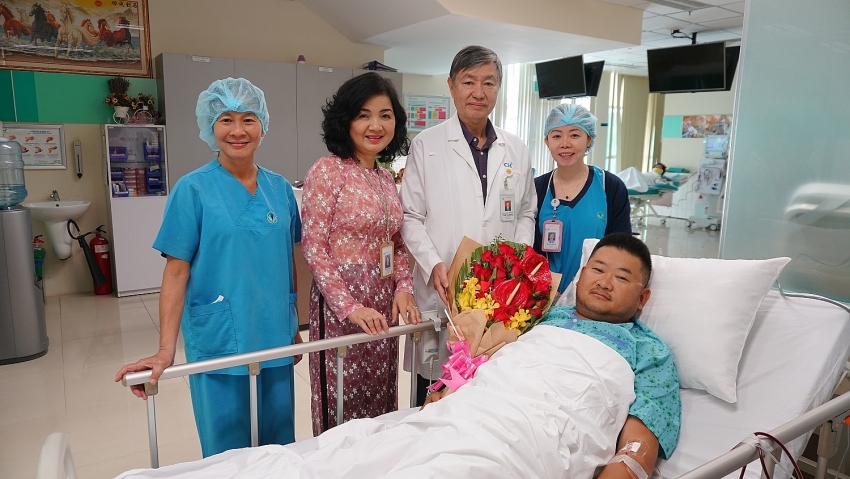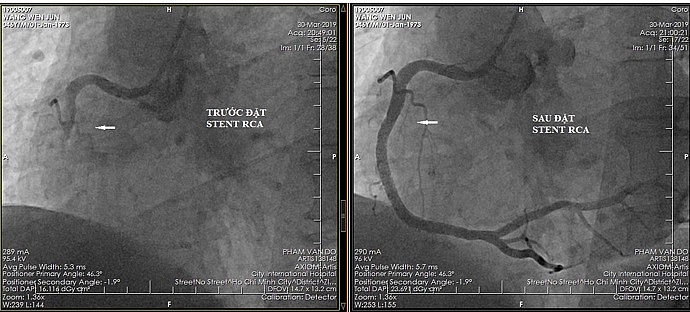CIH saves Australian tourist from severe heart attack
 |
| CIH's medical team revisiting the patient |
On March 30, a patient, named Jun, was admitted to the CIH emergency unit with the symptoms of dizziness, excessive sweating, fatigue, and low blood pressure.
After conducting the examination and laboratory tests, the results showed that he had a complete heart block, right bundle-branch block, hyper-acute T waves in the inferior leads, and reciprocal ST-segment depression in the anterolateral leads.
In other words, much of his heart had stopped responding properly to nerve impulses telling it to beat, and other parts of the heart were beating poorly – all the symptoms of a critical heart attack.
An immediate procedure was performed by doctor Tung, head of Cardiology and Vascular Intervention. Coronary angiography revealed a dominant right coronary artery (RCA) with 80 per cent ostial stenosis. A drug-eluting stent was successfully deployed to the ostial RCA lesion with an outstanding angiographic result.
The expert team realised that the patient’s history of end-stage chronic renal disease (ESRD) is the actual factor behind the poor outcome of percutaneous coronary interventional (PCI) procedure and the growing threat of Jun developing acute renal failure complications after the first post-operation.
 |
| Angiography of coronary artery, before and after the successful deployment of drug-eluting stent |
“The heart team” put Jun on dialysis programme. Over several days, the positive outcome was visible as hemodynamics stabilised, biomarkers of acute coronary syndrome gradually reduced, and heart rate gradually improved, with satisfactory renal recovery. The headache and fatigue fully ceased. Permanent pacemaker implantation was avoided. He was discharged from hospital seven days later.
“This was his first trip to Vietnam with a group of friends. As soon as he arrived at the airport, he had episodes of light chest pain, shortness of breath and dizziness, so he was transferred to the nearest hospital," shared Jun's wife. “He got diagnosed with vestibular disorders and indicated for further in-hospital investigations. However, as he and his friends thought it wouldn’t be that serious and my husband looked healthy, they decided to just take whatever was prescribed but not to waste time at the hospital.”
“After that, his symptoms quickly worsened, until he was taken to the City Hospital International Emergency Department to discover everything was a second away from death. We thank all staff of City International Hospital, especially the professors for reviewing and solving his urgent issue and the rapid rescue.”
 |
| Jun and his wife at CIH |
My Van, director of CIH’s City Plus Programme, said, “Having a multi-disciplinary team of top physicians looking at patients’ conditions to find the best possible solutions is critically life-saving for patients. In particular, the team needs to communicate with patients and families, listing out all possible solutions in detail to help patients and their relatives feel comfortable and safe with their treatment decisions.”
Flying risks for travellers with a heart disease
“Heart attack” is actually not a medical term – “myocardial infarction” is the proper name. Most heart attacks are caused by a blood clot that blocks one of the coronary arteries that bring blood and oxygen to the heart.
If the blood flow is blocked, the heart is starved of oxygen and heart cells die. This differs from sudden cardiac arrest, which occurs when the heart develops an arrhythmia that causes it to stop beating.
| CIH has been very successful in winning many recent emergency cases to save the lives of thousands of medical tourists, especially treating heart attacks, traumas and road accidents. |
Air travel, while a part of modern life, could raise the risk of experiencing heartbeat irregularities among older individuals with a history of heart disease. Altitude-induced hypoxemia leads to an increase in heart rate, a decline in stroke volume, an increase in the atrial component of the left ventricular filling, and a progressive rise in pulmonary vascular resistance, all of which are of potential concern in patients with chronic heart failure.
Cabin pressure varies and the cabin environment is not a normal one. Its temperature is controlled, but humidity is low – commonly 10-20 per cent – which can give rise to the drying of the air passages.
It is also cramped, restricting movement. If passengers have a heart condition, they should always check with their doctors to ensure they are fit for air travel.
“CIH has been very successful in winning many recent emergency cases to save the lives of thousands of medical tourists, especially treating heart attacks, traumas and road accidents. We hope through these stories, our hospital can build credibility in the expatriate community and medical tourists on par with other regional providers. We want to become a Vietnam-based pioneer in attracting medical tourists and help promote Vietnam as a medical hub of Southeast Asia and the Asia Pacific,” said John Lucas, CEO of CIH.
What the stars mean:
★ Poor ★ ★ Promising ★★★ Good ★★★★ Very good ★★★★★ Exceptional
Related Contents
Latest News
More News
- NAB Innovation Centre underscores Vietnam’s appeal for tech investment (January 30, 2026 | 11:16)
- Vietnam moves towards market-based fuel management with E10 rollout (January 30, 2026 | 11:10)
- Vietnam startup funding enters a period of capital reset (January 30, 2026 | 11:06)
- Vietnam strengthens public debt management with World Bank and IMF (January 30, 2026 | 11:00)
- PM inspects APEC 2027 project progress in An Giang province (January 29, 2026 | 09:00)
- Vietnam among the world’s top 15 trading nations (January 28, 2026 | 17:12)
- Vietnam accelerates preparations for arbitration centre linked to new financial hub (January 28, 2026 | 17:09)
- Vietnam's IPO market on recovery trajectory (January 28, 2026 | 17:04)
- Digital economy takes centre stage in Vietnam’s new growth model (January 28, 2026 | 11:43)
- EU Council president to visit Vietnam amid partnership upgrade (January 28, 2026 | 11:00)

 Tag:
Tag:

























 Mobile Version
Mobile Version